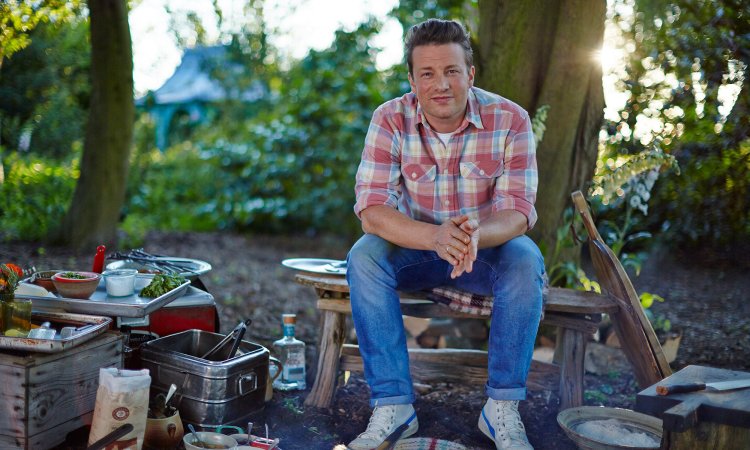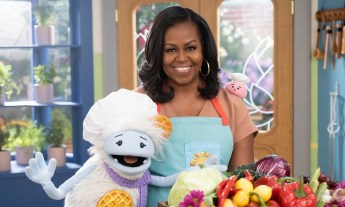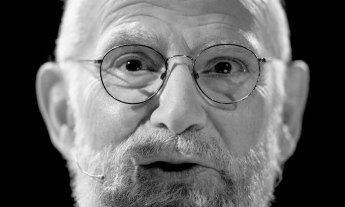
Activist chef Jamie Oliver talks about the future of food — cooking, eating, and farming.
Obesity is on the rise in neighborhoods around the world — and so are the rates of diabetes and heart disease. Can a small bit of nutrition education make a big difference? Activist chef and 2010 TED Prize winner Jamie Oliver thinks so. (Watch his talk, Teach every child about food.) His TED Prize wish was to help kids understand where food comes from, how to cook it, and how it affects their body — and to support better nutrition education for all, Oliver created the Food Revolution. Below, Oliver’s current thoughts on the future of food.
By 2040, even fast food will contain a much bigger rainbow of fruits and veggies.
What do you think people will be eating more of in 2040?
I reckon it will be the norm to consume everyday food — even fast food — that contains more whole grains, less added sugar and a much bigger rainbow of fruits and veggies. I’m talking about wholesome, nutritious food that’s more traceable, less processed and easily accessible to everyone. With regard to meat, hopefully the narrative of “quality not quantity” will have reached more people, helping them live longer, healthier lives. I also think that by 2040 the science and measurement of the effects of good food and nutrients will be super robust.
I hope that an integrated approach to food and farming policy will be prioritised in the next decade or so to support smaller farmers and incentivise all farmers to adopt sustainable operation methods. Smaller farms will hopefully find ways to survive by working together in a more strategic way through digital technology, allowing them to be more seasonal, fresh, agile and unusual in the range of products they carry and serve. What will be exciting is the coming together of small farms to serve their communities — which has already started happening in pockets around the UK — so that as consumers we are buying from a group of farmers and producers that are local to us. Technology should allow the smaller farmer to go to lower prices, making them more competitive. On the other extreme I’d like to think that bigger famers will focus on the impact they’re having on the environment, with much less misuse of chemicals and pesticides and higher animal welfare standards.
As a result of better farming methods and healthier individual habits, I also hope to see better education and clearer labelling of farming methods, as well as provenance and nutrition, on the food we eat, so that we can all become savvy consumers. It should be statutory to know how something is grown and whether anything is added to that process, such as herbicides or pesticides, as well as the impact they can have on you and your children.
If we could change three things about our diet — to improve our own health and the health of our planet — what should they be?
Well, we live in a world where there are 1.5 billion people who are overweight or obese, and we have so many unsustainable food production methods, huge amounts of food waste — and all of this needs to be addressed.
So, in no particular order, the first thing we can all do is to eat less meat and more locally grown vegetables — that will have the biggest impact from a planetary point of view, and it’ll be good for us too.
The next thing would to be embrace food that’s been grown within cities using surplus energy from everyday city systems. This is something we really need to act on — harnessing energy that is already there to create extremely fresh food that has a positive environmental impact and genuine social value, grown as part of an urban community. Like I said, quality not quantity is key. In an ideal world, animal products should all come from animals living according to their natural place in the ecosystem, and in harmony with other natural systems.
We’LL get on top of food waste — growing, selling, buying and eating exactly what we need.
The third thing, which relates to diet in a roundabout way, is to start addressing food waste. We need to get on top of everything from surplus production to surplus consumption — to start growing, selling, buying and eating exactly what we need. We also need to be cleverer about how we use byproducts of the food industry. This will all have a massive impact.
What do you foresee as being the next big advance in food production in the next 10 years?
I don’t think there’s a simple answer here — there are loads of areas that are changing and evolving. Whether we like it or not, genetically modified crops will be completely and totally taken to new levels. There is a plethora of debate around that, for better or for worse: in whose hands, if any, is this to be trusted? People argue that we could help eradicate famine by using GMOs in the developing world, but who knows what negatives could come alongside that? We focus too much on the ability of technology to intensify production; this is not where we’ll find the solution. There are now more people in the world who are overweight and obese than who are hungry; the solution is not to simply produce more. In order to change, there needs to be a focus on sustainable diets.
We focus too much on using technology to intensify production. We should be working with nature, not trying to control it.
From a farming point of view, the management of water and the displacement of that water through selling large amounts of food to other parts of the world will have to happen in a more advanced way. It’s a massive problem that needs attention, and technology must have a role to play there.
Another area where technology must surely play a part is in the better management and understanding of our soil. We should be working with nature, not trying to control it. We’re already seeing a new era for sustainable and regenerative agriculture using big data combined with a better understanding of microbiology, like technology to repair soil degraded by decades of intensive, industrial agriculture. The aim is more nutrient-dense food and less misuse of our planet.
Overfishing in most oceans is also a huge problem. But thanks to the development of technology for sustainable fishing, as well as new technology for organic and sustainable aquaculture, I think the tide is already turning.
And finally, I think more consideration and understanding about Environmental Profit & Loss (EP&L) will be key. Typically when we design businesses and sell products we only consider the human impact. But if you suddenly started having to pay for all the other elements — biodiversity, rainfall, bees pollinating crops, even sunlight — it changes the setup of that business. It immediately starts to make you treat what’s free in a completely different way, and in a way that is sympathetic to the planet we will hand over to the next generation. It sounds a bit hippy, but you can’t deny what we’ve taken for granted.
Every child will be taught about food — where it comes from, how it affects their body, and how to cook it.
Technology really needs to become all about you, and wearable technology is certainly headed that way. It’s about gathering all that background info — genetics, dietary preferences, religion, age, location on the planet — and then loving you, encouraging you, and making suggestions. Suggestions could be ways to find produce, people, restaurants, cooking schools — whatever’s relevant specifically to you and that will satisfy your individuality. It all comes back to the importance of food education.
If a genie granted you one wish regarding food and technology, what would you wish for?
Ultimately, my only wish is always the same as my TED Prize statement. I wish for every child — in whichever way is relevant at the time — to be taught about food, where it comes from, how it affects their body, and how to cook it, allowing them to be confident in the kitchen and to enjoy food and all the pleasure it can bring them and their future family. That’s my only wish, and our biggest challenge.
Featured image © Jamie Oliver Ltd, Photographer: Joe Sarah


















